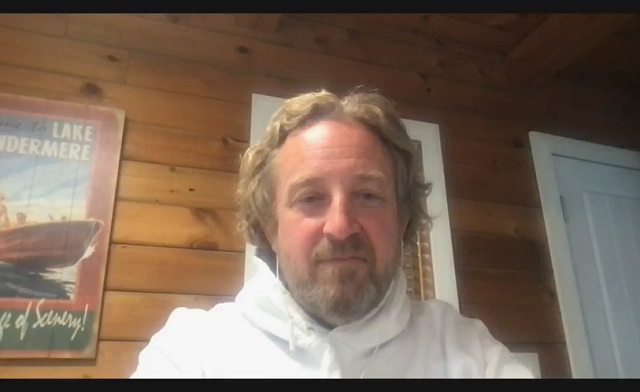Alberta
Canadian pizzeria owner planning civil suit against gov’t officials over tyrannical COVID mandates

Alberta
Thousands of Albertans march to demand independence from Canada

From LifeSiteNews
Thousands of Albertans marched upon the province’s capital of Edmonton this past Saturday in the “I Am Alberta Rally,” calling for the province to immediately secede from Canada in light of increasing frustration with the Liberal federal government.
The rally saw an estimated 20,000 to 30,000 people march on the steps of the Alberta legislative building, demanding that a referendum be held at once to allow Alberta to leave Canada.
“We can’t delay. We can’t slow down,” well-known freedom lawyer Keith Wilson said at the rally as he spoke to the crowd.
“This is our moment. This is our future. For our families, for our children, for Alberta. Alberta will be free.”
The group behind the rally, the Alberta Prosperity Project (APP), bills itself as a sovereignty advocacy group. As reported by LifeSiteNews earlier this year, the APP wants to put Alberta independence to a question to the people via a referendum.
The rally also comes after certain members affiliated with the APP such as Jeffrey Rath and Dr. Dennis Modry earlier the month met in Washington, D.C. with cabinet-level U.S. politicians to discuss Alberta’s potential independence from Canada.
U.S. President Donald Trump has routinely suggested that Canada become an American state in recent months, often making such statements while talking about or implementing trade tariffs on Canadian goods.
The APP on July 4 applied for a citizen-led petition presented to Elections Alberta that asks, “Do you agree that the Province of Alberta shall become a sovereign country and cease to be a province in Canada?”
The group is hoping to have the referendum on the ballot as early as next year and has accused the Liberal federal government of encroaching on Alberta’s ability to manage its own affairs.”
The group says an independent Alberta would allow it to “keep our resources, grow our economy, and reinvest in Alberta families, businesses and infrastructure.”
As it stands now, the referendum question has been referred to the courts to see whether or not it can proceed.
Alberta Conservative Premier Danielle Smith does not support a fully independent Alberta. However, she does advocate for the province to have more autonomy from Ottawa.
As reported by LifeSiteNews, Smith said her conservative government will allow but not support a citizen-led referendum on independence.
Despite not advocating for an outright separate Alberta, Smith’s government has not stood still when it comes to increasing provincial autonomy.
Smith’s United Conservative government earlier this year passed Bill 54, which sets the groundwork for possible independence referendums by making such votes easier to trigger. The bill lowers the signature threshold from 600,000 to 177,000.
As reported by LifeSiteNews last week, Smith’s government introduced a new law to protect “constitutional rights” that would allow it to essentially ignore International Agreements, including those by the World Health Organization (WHO), signed by the federal Liberal government.
The calls for independence have grown since Liberal leader Mark Carney defeated Conservative rival Pierre Poilievre.
Carney, like former Prime Minister Justin Trudeau before him, said he is opposed to new pipeline projects that would allow Alberta oil and gas to be unleashed. Also, his green agenda, like Trudeau’s, is at odds with Alberta’s main economic driver, its oil and gas industry.
Alberta
Premier Smith sending teachers back to school and setting up classroom complexity task force

Taking action on classroom complexity
As schools reopen, Alberta’s government is taking action by appointing a class size and complexity task force to meet the challenge of increasingly complex classrooms.
Across Alberta, teachers are seeing more students with diverse learning needs and behavioural challenges, while incidents of classroom aggression are rising. To address these challenges head on, and in response to concerns raised by teachers, Alberta’s government will be appointing a Class Size and Complexity Task Force.
We recently formed the Aggression and Complexity in Schools Action Team to identify practical classroom focused solutions. Alberta’s government has received the action team’s draft final report and will use its recommendations to create a roadmap for safer classrooms. Alberta’s government will release the final report, and the task force will implement solutions, work with school boards to gather more data on classroom complexity and begin work to replace the 2004 Standards for Special Education.
“Teachers have made it clear that addressing classroom complexity and safety are among the most critical improvements needed in our education system. We are taking real action to meet those needs by strengthening classroom supports, hiring more teachers and educational assistants, and acting on the recommendations of the Aggression and Complexity in Schools Action Team. Parents, teachers and students all want the same thing – safe and supportive classrooms where every child can succeed.”
Teachers are vital to the success of Alberta’s education system. Over the next three years, school boards will be provided with funding to hire 3,000 teachers and 1,500 new education assistants to support students with complex needs. These funds may also be allocated to additional student support through assessments for complex needs, occupational therapy, physiotherapy or speech-language pathology, and other in-the-classroom supports.
“No teacher should ever be harmed while doing their job. We know that aggressive incidents have gone up sharply in recent years, and classrooms are becoming more complex. That’s why we’re doubling down on efforts to make classrooms safer and to give extra support to students who need it. Our goal is to create learning environments where every student can succeed.”
In November, Alberta’s government will work with school boards to gather information and data about class sizes and composition to ensure students are receiving the support they need. Information will be made available as soon as it is available and will be released annually thereafter.
Quick facts
- Between July and September 2025, the action team conducted engagement sessions with teachers, education partners and school boards through in-person and virtual sessions.
- This included front-line educators, families, disability organizations, community agencies, early learning experts and social service professionals.
- Budget 2025 included $55 million to help address classroom complexity – a 20 per cent increase from the previous year.
Getting Alberta’s kids back to school
If passed, Bill 2, the Back to School Act, will restore stability in Alberta’s education system and ensure students can return to learning without further disruption.
The ongoing teachers’ strike has disrupted classrooms across Alberta, setting back student learning and deepening achievement gaps. Each day schools remain closed, students lose critical instructional time, routine and support. This proposed legislation will end the strike and establish reasonable terms for a new teacher collective agreement.
“This strike has gone on long enough. It’s clear there’s no path forward unless we act. The Back to School Act refocuses everyone on what matters most, the education of Alberta’s students. Bill 2 puts students back at the centre of our system, while we continue to work with teachers and families to build lasting stability in Alberta’s schools.”
The Back to School Act legislates the terms of the September 2025 tentative agreement, which provided a 12 per cent salary increase over four years, additional market adjustments of up to 17 per cent for most teachers, and the hiring of 3,000 teachers and 1,500 educational assistants. The collective agreement will be in effect from Sept. 1, 2024, to Aug. 31, 2028.
“The time for labour stability is now. This legislation provides a positive path forward despite an interrupted school year. This is a necessary step and the most responsible decision for kids, teachers and parents. If Bill 2 is passed, it is my hope that classes will resume as soon as Wednesday, October 29.”
The last deal put on the table by the Alberta Teachers’ Association demanded an additional $2 billion from government. This was a clear display that the union had no intention to bargain in a reasonable manner with the government and present a fair offer.
“We believe invoking the notwithstanding clause is a necessary measure to end the undue hardship caused by the teacher strike. This strike has reached a point that is causing irreparable harm on student learning. Our government will not hesitate to use every available legal tool in defence of students.”
This legislation is the only responsible path forward to restore stability, protect students and ensure Alberta’s classrooms focus back on learning. Alberta’s government remains fully committed to strengthening the education system, supporting teachers, and putting the success and well-being of students at the heart of every decision made.
Key facts
- Bill 2 would end the province-wide teachers’ strike and legislates a new collective agreement.
- The agreement covers Sept. 1, 2024, to Aug. 31, 2028 and provides:
- A 12 per cent salary increase over four years.
- Additional market adjustments of up to 17 per cent for 95 per cent of members.
- 3,000 new teachers and 1,500 educational assistants to reduce class sizes and enhance support.
- These terms reflect the September 2025 tentative agreement recommended by the Alberta Teachers’ Association leadership.
- The legislation includes financial penalties for non-compliance and suspends local bargaining during the agreement to ensure labour stability through 2028.
-

 Business1 day ago
Business1 day agoTrans Mountain executive says it’s time to fix the system, expand access, and think like a nation builder
-

 Alberta2 days ago
Alberta2 days agoPremier Smith sending teachers back to school and setting up classroom complexity task force
-

 Alberta2 days ago
Alberta2 days agoThousands of Albertans march to demand independence from Canada
-

 Crime2 days ago
Crime2 days agoSuspect caught trying to flee France after $100 million Louvre jewel robbery
-

 Addictions2 days ago
Addictions2 days agoThe Shaky Science Behind Harm Reduction and Pediatric Gender Medicine
-

 Business2 days ago
Business2 days agoClean energy transition price tag over $150 billion and climbing, with very little to show for it
-

 International22 hours ago
International22 hours agoStrongest hurricane in 174 years makes landfall in Jamaica
-

 Business1 day ago
Business1 day agoFlying saucers, crystal paperweights and branded apples: inside the feds’ promotional merch splurge








